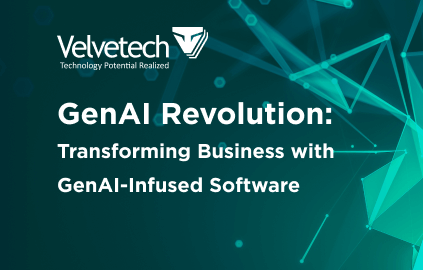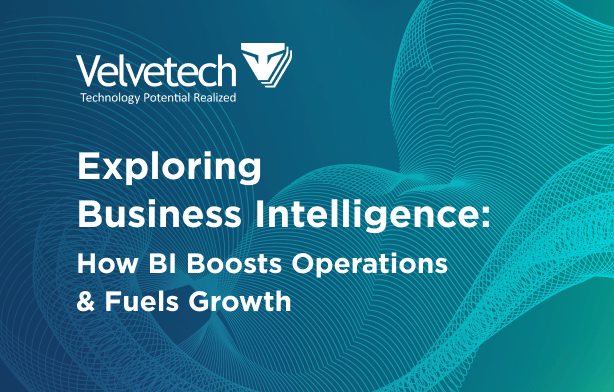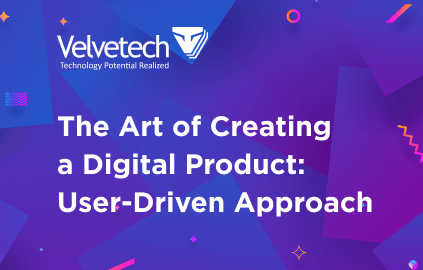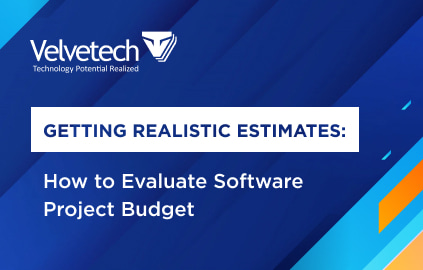Artificial intelligence has long been the top subject of conversation in business. After all, over the years, it’s become clear that the extensive benefits AI can deliver largely outweigh any initial investment it may require.
According to Accenture, 97% of executives believe that GenAI will totally transform their company. With such bold expectations and enormous AI market growth with a forecast to reach $800 million by 2030, it’s easy to see this technology is garnering so much attention across all kinds of industries.
So, if you’re also excited about AI software development and want to know what this innovation can do for your company, keep on reading. Today, we’re diving into the subject of artificial intelligence in business and will be sure to cover its role, main pros, the popular use cases, and how you can deal with the challenges that AI integration may pose.
Key Highlights
- AI-powered call centers help agents lead the conversation through fruitful conclusions, close more deals, and resolve issues pretty quickly, thus elevating customer satisfaction.
- By 2028, card fraud losses are expected to hit $44 billion worldwide. Meanwhile, AI-powered solutions can significantly enhance fraud detection efforts, helping keep your business secure and trustworthy.
- Typically, AI-based solutions require high computational speed, so if your infrastructure is based on legacy systems, deploying AI tools may become quite tricky.
- AI relies on the data it’s trained on, and even small inaccuracies or biases in variables can cause serious ethical concerns.
GenAI for Business
Watch our webinar to uncover how to integrate GenAI for improved productivity and decisions.
Benefits of Artificial Intelligence in Business
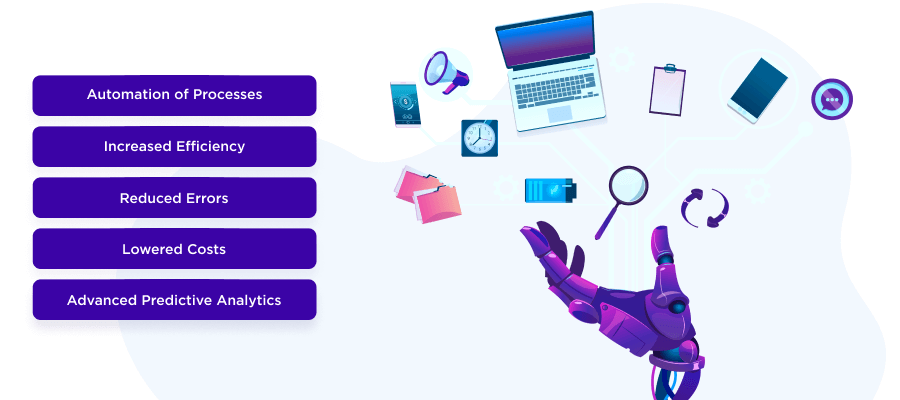
Artificial intelligence has gained such widespread popularity due to the increasing complexity of the landscape that organizations currently operate in.
Customer preferences are changing frequently, demands in terms of service quality are higher than ever, and the amount of data for employees to sort through is growing exponentially. All these elements have made businesses prime to leverage AI, a technology capable of carrying out tasks that typically require human intelligence.
Discover the Top 9 AI Opportunities that Lie Ahead
Overall, there are many advantages of artificial intelligence in business, but let’s have a look at the most lucrative ones:
Automation of Processes
It’s fair to say that business process automation is the heart of every successful venture. From streamlining data entry for accurate insights to building smart chatbots for round-the-clock customer support. These are just a few examples of how automation helps achieve smart operations.
And a hefty dose of what makes automation possible and efficient rests on the shoulders of AI.
Find out the core Benefits to Expect from Business Process Automation
Increased Efficiency
If you want to take proactive steps and make a data-driven business strategy, then real-time monitoring has no alternative. For example, you can use AI in your inventory management to track stock levels right on-the-spot. This way, you can prevent both stockouts and overstocking.
Read on to learn how to Say Goodbye to Empty Shelves
Reduced Errors
No matter how skilled your employees are, they are prone to errors. Well, some tasks like data entry, customer support, and record updates can turn out to be pretty time-consuming and exhausting.
Meanwhile, AI-driven technologies can smoothly handle any kind of task 24/7, work without breaks, and work with high accuracy.
Lowered Costs
Initially, you may invest heavily to implement artificial intelligence in your operations, but the long-term impact of AI on your business will definitely be worth it. Specifically, you may save on staff and avoid possible costly mistakes caused by manual errors.
Advanced Predictive Analytics
When it comes to running a stable and successful business, you should be ready to navigate plenty of potential risks smoothly. Some of them, like compliance risks, equipment failures, or cyber attacks, may become real headaches.
Well, when it comes to minimizing operational risks, it’s better to be safe than sorry. ML algorithms can become your helping hand to get there. Based on historical data, they provide an accurate forecast on possible issues, thus empowering you to think and act a step ahead.
It’s worth mentioning that these advantages are not sector-specific. So, no matter the industry you operate in, there’s definitely more than one way for you to benefit from the implementation of artificial intelligence.
Learn about Artificial Intelligence in Healthcare
Popular AI Uses in Business
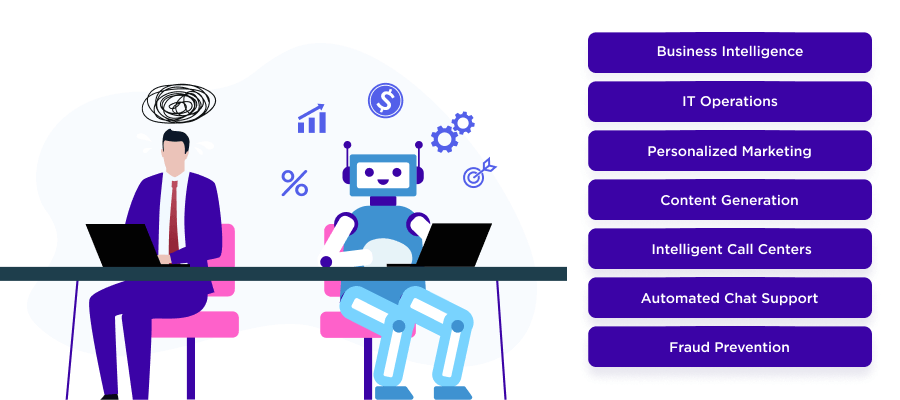
Now that we’re clear on the benefits that artificial intelligence can bring to your organization, let’s find out how the technology can actually be used in business. Today, we’ll focus on the seven most popular AI uses, but of course, depending on the sphere you work in, there can be more.
1. Business Intelligence
Due to an increasing amount of data being generated from various business areas, it has become highly difficult for some organizations to actually extract meaningful insights from all the digital information they possess. Hence, companies are now turning to AI to boost their business intelligence through speedy data mining and analytics.
AI-powered business intelligence software, exemplifying agentic AI, essentially works to help organizational leaders make smart, data-driven decisions. Typically, on the basis of easy-to-digest reports, performance indicators, customer behavior insights, and other trends that have been extrapolated by the algorithms from the provided data.
Generally, business intelligence solutions can come in various shapes and sizes. From simple web dashboards and reports to more complex data mining software — there are multiple ways for the algorithms to deliver crucial knowledge to you.
Transforming Business Operations with a BI Approach
You must be working with volumes of data daily, and we know it. It's time to extract meaningful insights from it.
Watch our webinar to learn the secrets of business intelligence, modern BI tools for data analysis, and best practices for accurate results.
2. IT Operations
How much time do you think it would take your IT staff to process all the crucial data to ensure smooth system operations? If done manually, probably quite a lot. However, with AI-powered technologies, it’s possible to noticeably elevate IT operations.
In particular, AIOps (artificial intelligence for IT operations) not only provides insights into potential problems but also pinpoints the root of incidents. Moreover, AIOps suggests smart recommendations to promptly overcome issues, like restarting servers or updating configurations.
You see, with an AI-powered system at their fingertips, your IT team may effortlessly detect the source of the problem and take immediate action to resolve it.
3. Personalized Marketing
With an extensive range of businesses vying for customer attention, it’s more important than ever to stand out. Often, this can be done through high-quality personalization efforts.
The truth is, in modern realities, personalization has become an imperative tool within a marketer’s arsenal. Today 81% of consumers prefer to deal with companies that deliver tailored interactions. Yet, a truly personalized marketing strategy can only be created through accurate customer segmentation and behavior monitoring.
As you can imagine, AI can help in this department as well. Primarily, by analyzing data from various sources, intelligent solutions can come up with complete customer profiles and generate predictions about what each user might be looking for next. Thus, enabling you to offer the right product or service to the right person at the right time.
User-Driven Approach
Watch our webinar and learn the top ways of reducing poor user satisfaction, low adoption rates, and decreased loyalty.
4. Content Generation
Let’s admit, how many times have you used ChatGPT to generate content since it is on the rise? Probably, pretty often.
So, it’s not surprising that among the most useful and widely spread applications of AI in business are content generation tools. Whether it’s brainstorming topic ideas or creating personalized email campaigns and other marketing materials, these tools are like knights in shining armor.
Just a couple of requests, and you’re there. Who wouldn’t want that? The key is to write relevant prompts to get straight-to-the-point answers.
5. Intelligent Call Centers
Artificial intelligence plays an invaluable role in the effectiveness of sales and customer service teams, especially when it comes to call center performance.
Learn more about Artificial Intelligence in Sales
You see, when it comes to making calls and stirring the conversation towards a fruitful conclusion, sales and customer service agents may struggle to navigate the uncertainty that comes from having a real-time discussion. However, with the help of AI, this doesn’t have to be the case.
AI-based contact centers can elevate the productivity of the entire department by providing conversation intelligence and extensive call analytics that support your agents to help close more deals and resolve customer issues faster.
Moreover, by integrating with your CRM platform, these intelligent solutions can unify all of your communication efforts and simplify the data entry processes that agents have to deal with on a daily basis.
Find out how Velvetech’s AI Call Analytics Helped Boost Insurance Sales
6. Automated Chat Support
Excellent customer support is non-negotiable in the hyper-digital world we live in. Customers don’t want to wait too long before getting a response back on an issue they may be facing. Yet, having a team working round the clock to answer queries can get quite expensive.
So, this is where AI-powered chatbots come to the rescue with their automated reply capabilities. Thanks to natural language processing, these intelligent solutions can decipher a received question, find the relevant answer, and respond in a way that is similar to how a human would. Plus, most importantly, in a highly contextual manner that actually helps the customer.
So, automated chatbots are some of the most popular applications of AI in business. Likely, due to their ability to reduce operational expenses and efficiently cater to clients’ needs. Hence, definitely consider adding this AI application to your must-have list if you often find yourself struggling to deliver impeccable customer service.
Discover more Ways of Improving the Customer Experience
7. Fraud Prevention
The last AI in business use case we’ll discuss today is focused on security and fraud prevention. As you can imagine, in industries like finance, insurance, and healthcare, fraud-related incidents can end up costing companies a lot of money. Thus, timely detecting suspicious activity and deploying preventative measures is of utmost importance.
AI is a great aid in this area thanks to the ability of its machine learning models to monitor huge amounts of transactions and activities in real-time, detect risky behavior, and send out alerts before any true damage takes place. Thus, significantly reducing unwanted events and the hassle that can arise from them.
Statista predicts that by 2028 worldwide losses could reach $43.47 billion from card fraud alone. With such enormous forecasts, it’s easy to see why more and more businesses are turning to AI to boost their fraud prevention efforts. So, to ensure your company also remains safe and keeps customers confident in its reliability, consider leveraging AI to reduce potential fraud occurrences.
Challenges of Implementing AI
Now that you know how AI helps businesses, you may be eager to get started with implementation. However, it’s imperative not to rush because, like with most technologies, there can be some challenges along the way.
Hence, let’s first take a look at some of the most common risks in AI adoption so that you can be better prepared when starting development.

Outdated Legacy Systems
Before you dive headfirst into AI-driven business solutions, it’s worth taking a look over your existing infrastructure. You see, unfortunately, outdated legacy systems are often one of the major roadblocks that companies have to overcome prior to starting AI software development.
Since most AI-based solutions require high computational speed, your infrastructure has to be set up in a way that can facilitate it. Thus, legacy system modernization might be the first thing on your AI employment to-do list. After all, you don’t want to make substantial investments into this innovative technology only to require further integration services due to poor performance.
Discover how Velvetech performed Legacy System Migration for a Plants Growing Company
So, if you want to leverage artificial intelligence to its utmost potential, consider developing a robust and flexible infrastructure that will be fully compatible with the software you intend to build. Of course, if you’re lacking internal capabilities to assess the current state of your legacy systems — reach out to experienced vendors who can guide you throughout the entire process, from conception to deployment.
Learn the Best Practices for Updating Legacy Software

Data Scarcity
Another major concern that can come with implementing AI in business is data scarcity. Sure, it may seem counterintuitive to think about there being too little digital information when global data creation is projected to reach 394 zettabytes by 2028. Yet, you’ll be surprised how often there is too little of the right type of data.
For machine learning algorithms, which power the majority of AI applications, large amounts of data sets are needed to train the model. However, organizations often realize that the data they may have collected is largely unstructured, unlabeled, and thus unusable without preliminary cleansing.
As you can imagine, if faced with this difficulty, it’s one of the first things you’ll need to overcome on your AI adoption journey.
Check out how to Excel in Data Transformation

Algorithm Bias
Since artificial intelligence relies on data and learns from the information you put into it, the output is only ever as good as the contents that the algorithms train on. So, if training data incorporates human decisions and has underlying societal or historical inequities, an algorithm can develop a bias, thus raising serious ethical concerns.
We’ve already seen examples of such bias in large companies. For instance, in 2018, Amazon had to shut down an experimental AI-powered recruitment tool project after discovering it discriminated against women. This occurred due to the algorithm essentially teaching itself that male candidates were preferable since they were the ones who mostly submitted resumes for technical jobs.
So, while these types of difficulties can be avoided with the help of experienced data scientists, it’s of high importance for your business to keep the algorithm bias pitfall in mind when embarking on your AI development journey. After all, you don’t want to develop a faulty system and be questioned about the ethics of your software.

Data Security
As you already know, AI applications use a lot of data for learning and performing the tasks they’ve been created to do. Naturally, all this data needs to be stored and processed in a secure manner.
Thus, it’s imperative for businesses, especially those dealing with sensitive personal information like in healthcare, fintech, or insurance, to embrace best practices of data management. Specifically, through controlling access to sensitive data, implementing firewalls, DLP, and NAC systems, using data encryption, backing up digital assets, and embracing other relevant security measures.
Lack of Developers
Find out how to deal with the lack of IT talents without compromising project delivery.

Talent Gap
Yes, artificial intelligence is a buzzword, and it seems like everyone has been rolling over to this innovation in recent years. Yet, skilled talents in this niche are still among the core challenges to consider when employing AI. That’s probably not because people are not interested in becoming AI professionals. Mostly, it’s because of the complexity of AI.
Specifically, it requires a combination of skills in machine learning, deep learning, data science, programming, etc. Domain-specific knowledge also matters. As such, finding skilled AI experts can be far from simple. This also leads to a lack of strong AI leadership, which is critical to ensure your efforts deliver measurable value.
How to Get Started With Artificial Intelligence in Business
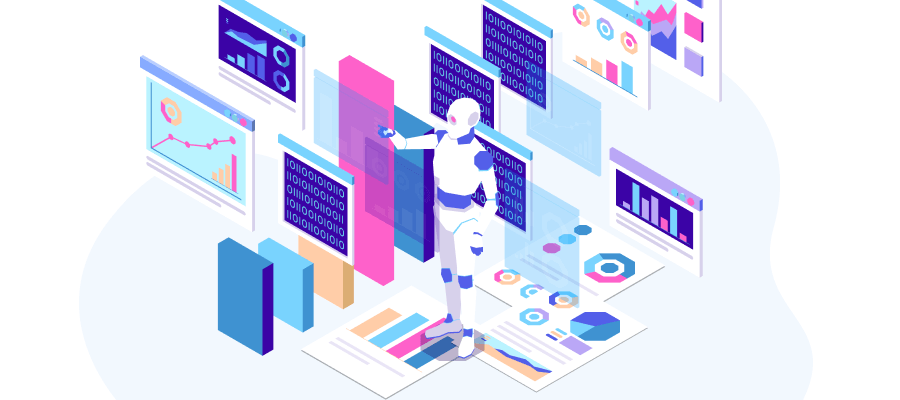
Depending on the level of existing knowledge you may have about artificial intelligence and its potential, the steps of implementing AI into your organization will differ. However, let’s take a look at the general course of action you’ll likely need to take.
1. Get Familiar With What AI Can Do
First and foremost, if you haven’t already, you’ll need to educate yourself on the potential of AI and what it can do for your business. Take advantage of online resources, talk to experts, and attend relevant workshops or events to increase your knowledge of the latest innovations in the field.
2. Identify the Key Challenges You Want AI to Solve
Once you’re familiar with AI, it’s time to figure out the main challenges you want the technology to solve for your company. Do you want to use AI to enhance your existing products or services? Or, do you want to leverage it to increase the efficiency of internal processes? These are the questions you’ll need to answer before moving on.
3. Prioritize Initiatives That Drive Concrete Value
Next, you need to figure out which AI initiatives to prioritize. Unsurprisingly, it should be the ones that will deliver the most business value and financial results.
4. Evaluate Internal Capabilities
After determining your goals and priorities, you need to evaluate internal capabilities and figure out what can be achieved within your ideal time frame. At this step, you need to identify whether you have enough internal resources to build an AI solution of your choice or if outsourcing development is the best route to pursue.
5. Bring in AI Experts
Finally, once you’re clear on the initiatives you want to take on and the internal capabilities you possess or lack, it’s time to bring in AI experts. Whether you choose to expand an in-house team with skilled data scientists or turn to an external vendor for help, finding top-tier talent is crucial for the success of your AI project.
Uncover the Pitfalls to Avoid When Outsourcing Software Development
Of course, this is just a high-level overview of the key steps in the AI development process. However, from here on, you can go into the nits and grits of each software building phase and make a more coherent plan along with your specialists.
Project Estimates
Watch our webinar to learn about the practical ways to evaluate your software project estimates.
Boosting Your Business with AI
Implementing artificial intelligence into a firm’s processes can be a game-changing strategy for many organizations, no matter if you are a small business or a large enterprise. From delivering in-depth business intelligence to preventing fraud, there’s no shortage of AI uses that your company can benefit from.
Of course, there are also quite a few challenges to overcome on your way to full-scale artificial intelligence implementation. Thus, at Velvetech, we offer extensive AI software development services with the goal of easing your workload and ensuring you can get a solution that suits your unique business needs as soon as possible.
So, don’t hesitate to reach out to our team if you’ve got an idea for an AI project or would like a consultation on the ways that this technology can help your firm. We’ll be happy to discuss a potential collaboration and help you achieve your goals.
